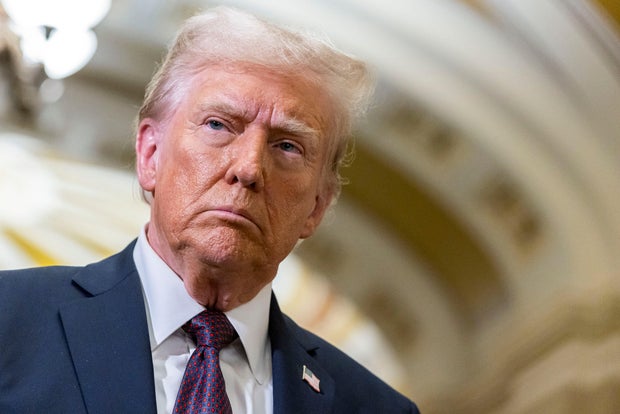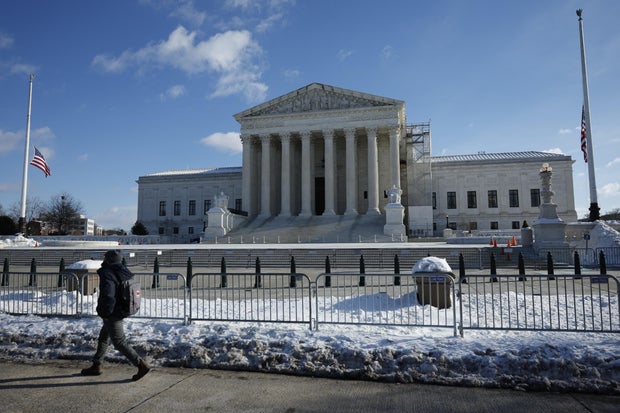TikTok’s lawyer says law targets “speech itself”
Francisco told the court that the divest-or-shutter law implicates the First Amendment and said it cannot satisfy any level of judicial scrutiny. He said the government’s target with the law is “speech itself.”
“In short, this act should not stand,” Francisco said.
He urged the court to temporarily ban the law “at a minimum.”
Justice Clarence Thomas kicked off the questioning for the justices, as has become typical in recent years, asking why a restriction on ByteDance, which is headquartered in Beijing, is a restriction on TikTok.
“You’re converting the restriction on ByteDance’s ownership of the algorithm and the company into a restriction on TikTok’s speech,” Thomas asked. “So why can’t we simply look at it as a restriction on ByteDance?”
Arguments kick off before the Supreme Court
Chief Justice John Roberts convened the court for arguments in TikTok’s challenge. Noel Francisco, who is arguing on behalf of the platform, will present TikTok’s case first. He has two minutes to deliver opening remarks without interruption before the justices can jump in with questions.
What does Trump think about the TikTok ban?
Valerie Plesch/Bloomberg via Getty Images
Trump sought to effectively ban TikTok during his first administration, but his executive order targeting the app was blocked by a federal court and later rescinded by President Biden.
But in the years since his August 2020 action, Trump has warmed to the widely popular platform. He met with TikTok’s chief executive officer at his Mar-a-Lago estate in December and has praised the app for helping him win over young voters in the presidential election.
Trump also submitted a friend-of-the-court brief with the Supreme Court urging it to pause implementation of the law to allow him time to negotiate a resolution that would keep TikTok operating in the U.S. while addressing the government’s national security concerns.
“President Trump alone possesses the consummate dealmaking expertise, the electoral mandate, and the political will to negotiate a resolution to save the platform while addressing the national security concerns expressed by the government — concerns which President Trump himself has acknowledged,” D. John Sauer, a lawyer for Trump, wrote in the filing.
The president-elect has said he intends to nominate Sauer to serve as solicitor general. If confirmed, he would represent the federal government before the Supreme Court.
Noting that Trump is set to begin his second term on Jan. 20, one day after the ban-or-divest law takes effect, Sauer wrote that Trump “has a particularly powerful interest in and responsibility for those national-security and foreign-policy questions, and he is the right constitutional actor to resolve the dispute through political means.”
What is the issue before the Supreme Court?
Lawyers for TikTok, the group of eight content creators and the Justice Department will be arguing whether the law passed by Congress last year violates the First Amendment.
TikTok’s attorneys have said the government’s justification is “at war with the First Amendment.” The legislation, lawyers for the creators wrote in their filing, “violates the First Amendment because it suppresses the speech of American creators based primarily on an asserted government interest — policing the ideas Americans hear — that is anathema to our nation’s history and tradition and irreconcilable with this court’s precedents.”
But the government has said the vast amount of information TikTok collects on its users could be wielded by the Chinese government for “espionage or blackmail” purposes or to “advance its geopolitical interests” by “sowing discord and disinformation during a crisis.”
“In response to those grave national-security threats, Congress did not impose any restriction on speech, much less one based on viewpoint or content. Instead, Congress restricted only foreign adversary control: TikTok may continue operating in the United States and presenting the same content from the same users in the same manner if its current owner executes a divestiture that frees the platform from the [People’s Republic of China’s] control,” the Justice Department said.
Who will be arguing before the Supreme Court?
Solicitor General Elizabeth Prelogar will be arguing on behalf of the federal government. Noel Francisco, who was solicitor general in Trump’s first administration, will present on behalf of TikTok and ByteDance.
Jeffrey Fisher, co-director of the Supreme Court Litigation Clinic at Stanford Law, will argue for the eight creators challenging the ban.
The court has set aside two hours for arguments, but they’ll likely go longer.
Why does the U.S. government want to ban TikTok?
Lawmakers and intelligence agencies have long had suspicions about the app’s ties to China and have argued that the concerns are warranted because Chinese national security laws require organizations to cooperate with intelligence gathering. FBI Director Christopher Wray told lawmakers last year that the Chinese government could compromise Americans’ devices through the software.
In classified briefings, lawmakers have learned “how rivers of data are being collected and shared in ways that are not well-aligned with American security interests,” Democratic Sen. Chris Coons of Delaware said last year.
In its filings to the Supreme Court last month, the Justice Department argued TikTok “collects vast swaths of data about tens of millions of Americans, which the [People’s Republic of China] could use for espionage or blackmail. And the PRC could covertly manipulate the platform to advance its geopolitical interests and harm the United States — by, for example, sowing discord and disinformation during a crisis.”
Congress prohibited TikTok on federal government devices in 2022, and a majority of states have barred the app on state government devices.
How the case arrived at the Supreme Court
TING SHEN/AFP via Getty Images
TikTok and ByteDance filed a legal challenge last May that called the law “an extraordinary and unconstitutional assertion of power” based on “speculative and analytically flawed concerns about data security and content manipulation” that would suppress the speech of millions of Americans.
“In reality, there is no choice,” the petition said, adding that a forced sale “is simply not possible: not commercially, not technologically, not legally.”
A federal appeals court issued a ruling in December that upheld the law, saying the U.S. government “acted solely to protect that freedom from a foreign adversary nation and to limit that adversary’s ability to gather data on people in the United States.”
A week later, the appeals court denied TikTok’s bid to delay the law from taking effect pending a Supreme Court review.
On Dec. 16, TikTok asked the Supreme Court for a temporary pause, saying it would suffer “immediate irreparable harm” if the ban is not delayed.
Two days later, the Supreme Court said it would take up the challenge to the law under an expedited timeline. It scheduled arguments for Jan. 10, nine days before the law takes effect.
What happens if the law takes effect
App stores, like those operated by Google and Apple, and internet-hosting companies will be barred from distributing TikTok. That means Americans who have already downloaded the app will be unable to update it, eventually making it obsolete. Those who have not downloaded the app will be unable to do so.
The government could impose penalties on the tech companies that continue to host TikTok on their platforms. The law does not penalize Americans for using the app.
Last month, the leaders of the House China Committee sent letters to Apple and Google telling them to be ready to remove TikTok from their app stores by Jan. 19.
The ban would be lifted if TikTok and ByteDance ever part ways.
But there are several pathways to avoid a ban outside of Supreme Court intervention, experts told CBS News. Read more about those options here.
When does the TikTok ban law take effect?
The law is set to take effect on Jan. 19, one day before President-elect Donald Trump’s inauguration.
In April, Congress swiftly passed the bipartisan legislation, known as the Protecting Americans from Foreign Adversary Controlled Applications Act, as part of foreign aid package. It was signed into law by President Biden.
The law gave TikTok nine months to sever ties with its Beijing-based parent company ByteDance, with the possibility of a 90-day extension if a sale was in progress by the January deadline. Absent a sale, TikTok is supposed to lose access to app stores and web-hosting services in the U.S. beginning on Jan. 19.



